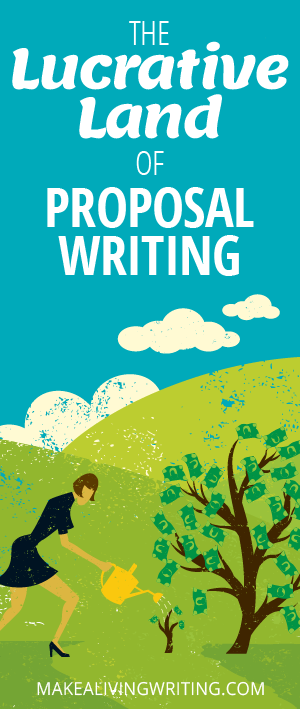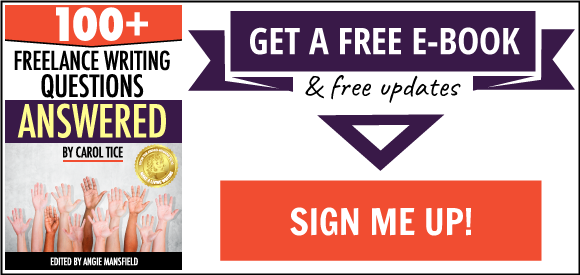When I got a random phone call from a prospect about a proposal writing gig, I was curious.
“I need help writing an RFP [request for proposal] for a multi-year, multi-million dollar cyber security contract for a government agency,” the person said. “The deadline is in 30 days. Can you help me?”
You can make a lot of money doing this kind of work, right? That’s what I thought. But I had my doubts.
Months before this unexpected phone call, I did a lot of leg work to try and land proposal writing gigs and government contract work. And nothing happened.
I navigated clunky government websites and studied the jargon. I registered my writing business on sites like the System for Award Management and FedBizOpps where you can find contracts. I tried to land big contracts, then smaller ones without success.
It seemed like a lost cause. And then this prospect found me on one of those government sites for contractors.
I bid $12,000 for the work, and the client accepted. Here’s what the proposal writing process looked like:
Proposal writing basics
When a business or government agency needs goods or services, they often send out an RFP [request for proposal] to an approved list of vendors (writing is a service, you can be a vendor.) It’s why I spent so much time getting listed on those government contracting sites.
What is an RFP? It’s a document that describes in great detail what an organization needs and wants to purchase. For example: a website redesign, a remodel project, chairs and desks, computers, or in this case cybersecurity services. These are some common RFP requests.
Why an RFP? The primary reason businesses and government agencies use RFPs is to collect competitive bids for goods or services.
What’s in an RFP? A lot of writing. Besides quoting a price, RFPs also have to make a compelling case to help the contractor win the project and may require information such as:
- Corporate history and information
- Financial reports
- Technical capabilities
- Inventory availability
- Case studies of similar projects
- Customer service/support
- Education, background, and experience of employees
- Ability to meet project deadline
- Warranty information
Fee factors for proposal writing
There wasn’t any time to waste when my prospect called. I was thrilled to learn the company had already won millions of dollars in contracts, and that my forgotten government profiles are still floating around out there, and still categorize me as a writer. I quoted $12,000 and the client accepted. There was no negotiation process.
Why such a high fee? It was a lot of work to complete this RFP and meet the deadline (4,000-plus words for eight pieces of the proposal, writing and editing a lot of technical content, and of course the drop-everything short time frame) The factors I considered were:
- Level of effort: Took two writers, one editor to get the job done
- Knowledge required: Government proposals for the cybersecurity industry
- Time frame: Had to rearrange my schedule to accommodate the job on short notice. We had a couple of rounds of edits to tighten up the drafts. Some of the revisions were required in less than 24 hours, and the price reflected that deadlines were non-negotiable.
Steps to success
I knew that this job might segue to a great relationship with a new client that might offer future corporate writing opportunities at great rates. I had one shot, on a tight schedule, to provide outstanding service. Here’s what made the job a success:
Experience
The help this client needed was right in line with my past experience.
Teamwork
I maintain a wide network of writers and often collaborate, and so should you. Bigger opportunities depend on it. I reached out to a writer I met a couple of years ago in the Freelance Writers Den. I also enlisted my longtime editor, who has a strong government background.
Dependability
The three of us completed eight pieces of work for the RFP that the client was very happy with. And of course we met the deadline.
Value
The price I quoted reflected the expected effort and our expertise, but also the rather intense schedule shuffling we’d have to do to accommodate a very short timeline with virtually no advance notice.
If you want to land proposal writing gigs…
Get your name out there. Sign up on your neighborhood small business directory. Join professional organizations. Sign up on sam.gov and fbo.gov. Beef up your online professional presence on your website, LinkedIn, etc., to be more visible and generate inbound leads.
Get it done. When opportunity presents itself, be 110 percent reliable. Answer the phone. Return emails. Pay attention. Read the materials your client sends to you. Put the effort in to do a great job.
Be fair. Don’t shortchange yourself. If a potential client asks you to do a rush job, let your price reflect that. At the same time, don’t take advantage. Remember, the end goal is to land a great client that you can work with for a long time.
When this proposal writing assignment was complete, the client immediately asked if we were available to help on the next one. That is all the assurance I need to know that the job went well.
Have questions about proposal writing? Let’s discuss in the comments below.
Kimberly Rotter is a freelance writer, blogger, and editor based in San Diego, Calif., who doesn’t watch TV. She also runs the website An Army of Writers.











